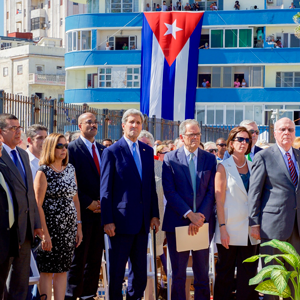
A moment of pure joy
MIAMI – It’s an understatement to say that for all of us who for years, in one way or another worked, risking our good standing with dear family members and friends, with neighbors and large sectors of our community, imperiling our jobs and careers, our livelihoods and economic prospects, the chance to live and speak freely and pursue our vocation in the city in which we grew up, indeed in some cases our very lives, last Friday morning was a moment of pure joy.
The raising of the American flag with the Malecon in the background, the playing of the national anthems of each country, were symbolic highlights. But what made the occasion truly historic was to hear Secretary of State John Kerry renounce the longstanding U.S. presumption to dictate or manipulate the destiny of Cuba, whether with a velvet glove or an iron fist, and state that Cuba’s future would be determined by Cubans.
This American presumption to lord it over Cuba goes back a long way, to the time of the founders. No less a figure than Jefferson foresaw Cuba falling by pure gravitational force, as a ripe apple falls to the ground, into the lap of the United States.
This presumption has reappeared in multiple forms at different times: the Monroe Doctrine, the Treaty of Paris, the Platt Amendment, the seizure of a portion of Cuban soil in Guantánamo, occupation and intervention, the Bay of Pigs, Operation Mongoose, countless failed attempts to assassinate Fidel Castro, the embargo/blockade, Radio and TV Martί, the Helms-Burton law… The list is incomplete but illustrative.
The beauty of Kerry’s speech is that it was almost completely devoid of the condescending attitude and sheer arrogance we have come to expect of U.S. officials and politicians when talking to, or rather down, to Cuba. Kerry, in contrast, came as close to showing respect for the principle of sovereign equality that is supposed to characterize relations between countries as it is possible for a U.S. Secretary of State to come.
That’s a big reason why Cuban American hard-line politicians like Ileana Ros-Lehtinen reacted with such white-hot fury. Ros-Lehtinen sneered at Kerry’s statement that the United States still wanted real democracy for Cuba and said that Kerry “didn’t even have the guts to invite the dissidents.” Ironically, this also happened to be the one Kerry statement that irked Cuban officials.
What the Cuban American hardliners would have wanted was for the U.S. to make the resumption of diplomatic relations conditional on changes in the Cuban political system and in the area of human rights. That would have been a non-starter for the Cuban government and would therefore have guaranteed the continuation of the status quo ad infinitum.
How would the United States have reacted if Cuba made reestablishing relations conditional on an end to the killing of unarmed black citizens by white policemen, the adoption of a system of free health care for all, a drastic reduction in the grotesquely large U.S. prison population, and a major decrease in this country’s scandalously high level of economic inequality in the United States today?
Posing the question this way reveals the absurdity of the hard-liners’ demand. Like Kerry, I too would welcome a more open Cuban society, but attempting to achieve this through external coercion and by punishing the whole Cuban people through sanctions is immoral and ignoble.
Although I would have liked to have been at the ceremony in person (and no one or nothing prevented me from doing so except personal circumstances), that did not temper my happiness one bit. But there are two things that to some extent did, though the feeling of overwhelming joy has never left me.
The first thing is that ultimately the Gordian knot in U.S.-Cuban relations is the blockade/embargo, and a reactionary Republican Congress is very unlikely to be persuaded to untie or cut that knot. This will mean additional senseless suffering for the Cuban people.
The second thing provoked a certain sadness, which is best expressed in the Spanish-language text (I have not found a good translation) of a song written and sung by Pablo Milanés sometime after Pinochet’s bloody 1973 coup in Chile:
“Yo pisaré las calles nuevamente/de lo que fue Santiago ensangrantado/y en una hermosa plaza liberada/me detendré a llorar por los ausentes.”
Cry for them, los ausentes or the absent ones, who fought for this moment but did not live to see it. The list is too long and surely I would miss many worthy names. So I will just mention in closing two that are emblematic of the early and latter phases of the struggle of Cuban Americans to create the conditions under which, as the Cuban American poet Richard Blanco said at the event last week, we can heal together: Lourdes Casal, Francisco Aruca.


